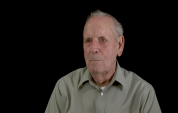4:12 | The Marines were bogged down on Leyte and Malhon Shoemake's Army unit was sent to help after their first trial on Guam. It was a difficult battle in the island hopping push toward Tokyo. On one of these Japanese held islands, among the freed prisoners, he saw a sight he will never forget. (This interview made possible with the support of COL ROBERT W. RUST, USMCR (ret.) in honor of LtGen Lawrence Snowden & LtGen George Christmas.)
Keywords : Malhon Shoemake Leyte Douglas MacArthur Tokyo Japan atrocity mutilated Japanese

Malhon Shoemake's first beachhead was Guam and after a long wade into shore, he saw the terrible devastation of war. The deaths of women and children were difficult to bear. He soon learned the tricks of the enemy, who liked to fight at night and sneak into your foxhole. (This interview made possible with the support of COL ROBERT W. RUST, USMCR (ret.) in honor of LtGen Lawrence Snowden & LtGen George Christmas.)
Iejima was a little island off Okinawa that saw some fierce fighting when Malhon Shoemake was there. He was shot twice and earned a Bronze Star for shooting the enemy right off the back of his sergeant, as well as carrying many wounded to safety. He received a third gunshot wound on Okinawa. (This interview made possible with the support of COL ROBERT W. RUST, USMCR (ret.) in honor of LtGen Lawrence Snowden & LtGen George Christmas.)
The Okinawa beachhead was not much different than the others, but after a couple of weeks there, Malhon Shoemake was on his way back to Hawaii for three months to recover from a wound. Once he returned to his unit, it was not long before the war ended and he was sent to Tokyo as a victor. (This interview made possible with the support of COL ROBERT W. RUST, USMCR (ret.) in honor of LtGen Lawrence Snowden & LtGen George Christmas.)
Malhon Shoemake had a sergeant who's gunsmith father sent his son to war with a custom made .45 pistol. As they fought their way across the Pacific, they made good use of "Old Betsy." It was added protection during their souvenir hunts, which were dangerous because of booby traps. (This interview made possible with the support of COL ROBERT W. RUST, USMCR (ret.) in honor of LtGen Lawrence Snowden & LtGen George Christmas.)
The living conditions were terrible during Malhon Shoemake's Pacific tour. Sleeping in wet holes combined with three wounds to give him trouble for the rest of his life, but he had no regrets. (This interview made possible with the support of COL ROBERT W. RUST, USMCR (ret.) in honor of LtGen Lawrence Snowden & LtGen George Christmas.)